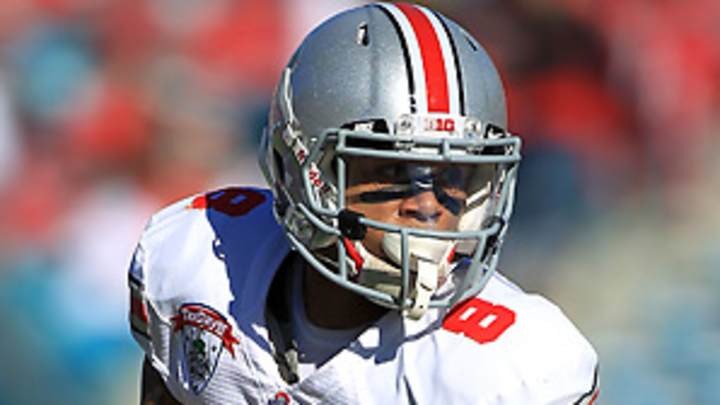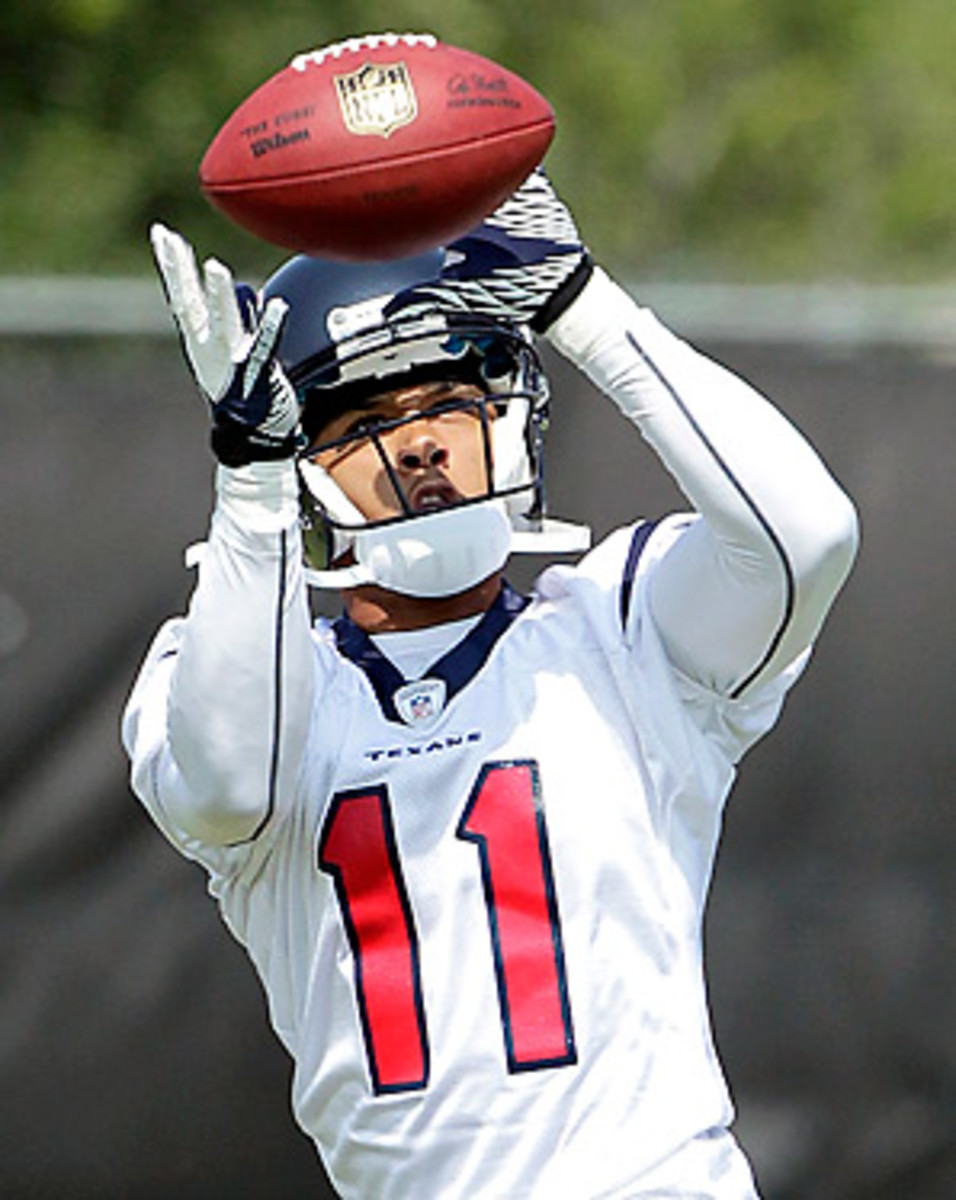Offseason Breakdown: Houston Texans

The Texans need DeVier Posey to grow into a reliable No. 2 receiver very quickly. (Getty Images)

With NFL training camps just around the corner, we’re taking a team-by-team look at how the offseason played out and what you can expect in 2012. Click here to read them all.
After years of being the chic summer pick for breakout team, the Texans finally delivered in 2011. But the breakout wasn't sudden if you followed the years of work by Gary Kubiak and Rick Smith.
Each year since Kubiak and Smith came aboard in 2006, pieces were added, positions were fortified. The Texans became an elite passing team shortly after trading for Matt Schaub in 2007. Then their front-7 caught on. The running game was next, followed by the secondary. A shift to the Wade Phillips-led 3-4 last year completed the picture.
Losing Matt Schaub and Mario Williams to significant injuries along the way was far from ideal, and derailed what looked like a very possible Super Bowl season. But there was a bright side: it proved to the Texans, and the world, how deep their roster was, allowing them to feel comfortable being bold in the offseason for the long-term sake of the franchise.
We don't have to wait for the Texans to arrive anymore. Now that they have, though, how will they respond?
2011 Record: 10-6 (first place, AFC South; lost to Ravens in divisional round)
Key Additions: ILB Bradie James, DE/OLB Whitney Mercilus, WR DeVier Posey, G Brandon Brooks, C/G Ben Jones, DE/DT Jared Crick
Key Subtractions: DE/OLB Mario Williams, ILB DeMeco Ryans, OT Eric Winston, FB Lawrence Vickers, CB Jason Allen, TE Joel Dreessen, WR Jacoby Jones, QB Matt Leinart, G Mike Brisiel
Team Strengths: QB, RB, DL, LB
Team Weaknesses: WR, OL
Three Things to Watch:
1. A lot of change despite the breakthrough season: Look at that list of key subtractions. It's more befitting a 6-10 team than one in the Texans' position. And the departures aren't just plentiful, they're significant. Mario Williams, DeMeco Ryans, Mike Brisiel, Eric Winston have all been very key players for the Texans, and are each still in the prime of their careers.
But, as Peter King wrote in MMQB a few weeks back, the Texans are confident that they could survive that turnover thanks to the depth they've built while avoiding huge paydays like the $100 million Williams got from the Bills.
In Williams' case, a number of young pass-rushers proved capable (with Whitney Mercilus drafted in the first round, just for good measure). Ryans wasn't a good fit in the Texans' new 3-4. Winston's release and Brisiel's departure are a bit more puzzling, but the team is confident that young guns Brandon Brooks and Derek Newton can take over the right side of the line soon, if not right away.
It's a big gamble for the Texans, to say the least, which is why many successful teams prefer to mostly stay the course over wholesale changes. But unsentimental teams like the Patriots and Eagles have had little trouble saying goodbye to productive players, and it's allowed both to be relevant over the long-term. Given the Texans' strong drafting and personnel moves over recent years, they deserve some benefit of the doubt.
2. Can the team find another threat opposite Andre Johnson?: The Texans have had an all-world threat at receiver in Andre Johnson, but have lacked a notable No. 2 who could take attention away from him. That bit them in 2011, when Johnson missed nine games with hamstring issues. Hamstring injuries are pesky for receivers, especially ones who will be 31 when the season starts. Add in a surprise knee scope in the offseason, and the Texans can't even rely on Johnson to be 100 percent all season long on top of the woes throughout the rest of the depth chart.
Kevin Walter is a solid No. 3, but isn't scaring opposing defenses enough to draw double-teams from Johnson as a No. 2. Lestar Jean has the potential to win the job, as well. Then there are rookies DeVier Posey and Keshawn Martin. Both have talent, but both also come with their growing pains. Posey, as we've outlined in the past, is a boom/bust kind of player, and Gary Kubiak has already lamented his conditioning. Martin has looked good, but Kubiak says he needs to work on finishing plays. That's not particularly damning -- it's a common mental issue for rookies -- but it illustrates that the Texans might not be able to rely on Martin this year to free up room in the secondary.
It looks like another No. 2-by-committee approach for the Texans this season, but that isn't likely to be enough to be an elite aerial attack in a league now dominated by the pass, even with Schaub returning to health.
3. Can the running game thrive again?: The uncertainty in the passing game puts more pressure on the backfield, which was second in the league and 10th in efficiency, according to Football Outsiders. Even missing some time, Arian Foster proved his league-leading 2010 was no fluke, and former second-rounder Ben Tate was a very pleasant surprise as a complementary back. Those two should again prove to be one of the league's best tandem backfields, and new No. 3 Justin Forsett adds a shifty, pass-catching element that should help diversify the team's attack. That's the good.
The bad? Well, again, there's the brand new right side of the line. The Texans' offensive line was fourth in run-blocking, again according to Football Outsiders, and the team had much more success running at right guard and tackle than on the left side. But without Brisiel and Winston, will the holes still be there? The Texans also use the fullback more than many teams, especially in short-yardage and red zone situations, and let Lawrence Vickers walk among their many departures. Maybe H-back James Casey and new addition Moran Norris can fill those shoes. They'll have to.
Outlook: The Texans' defense will be fine, even without Williams. The front-7 is absolutely stacked, and the secondary has two very good pieces in Johnathan Joseph and Danieal Manning. But can the offense, which has been among the league's best in recent years, keep up? That'll decide the Texans' season. More specifically, will the return of Schaub offset the deficiencies at receiver and on the offensive line?
More than anything, it's the loss of Brisiel and Winston that will hurt the team the most. It's awfully tough to replace one whole side of a very good offensive line and expect it to just keep on humming. And while I, and many others, expect big things from Brooks, I don't think they'll come quickly enough to keep up Houston's Super momentum.
The Texans still have enough talent to win the AFC South, and record-wise they shouldn't be too far removed from last year's 10-6 mark (looking at their schedule, I count nine wins as of now, although projecting a schedule in June is roughly as effective as literally reading tea leaves). But thanks to the injuries, 10-6 is not at all representative of how good last year's Texans team was, while 9-7 would be a more accurate signifier of where this team is in 2012. Again, this team has a very bright future, it just might take a small step back in 2012 to realize it.
-- By Tom Mantzouranis
